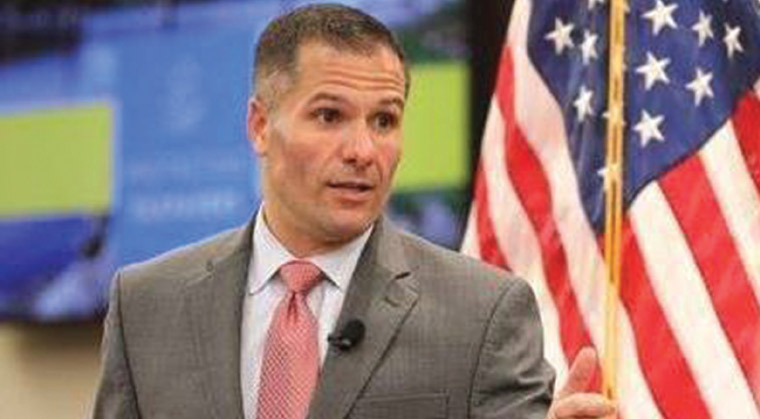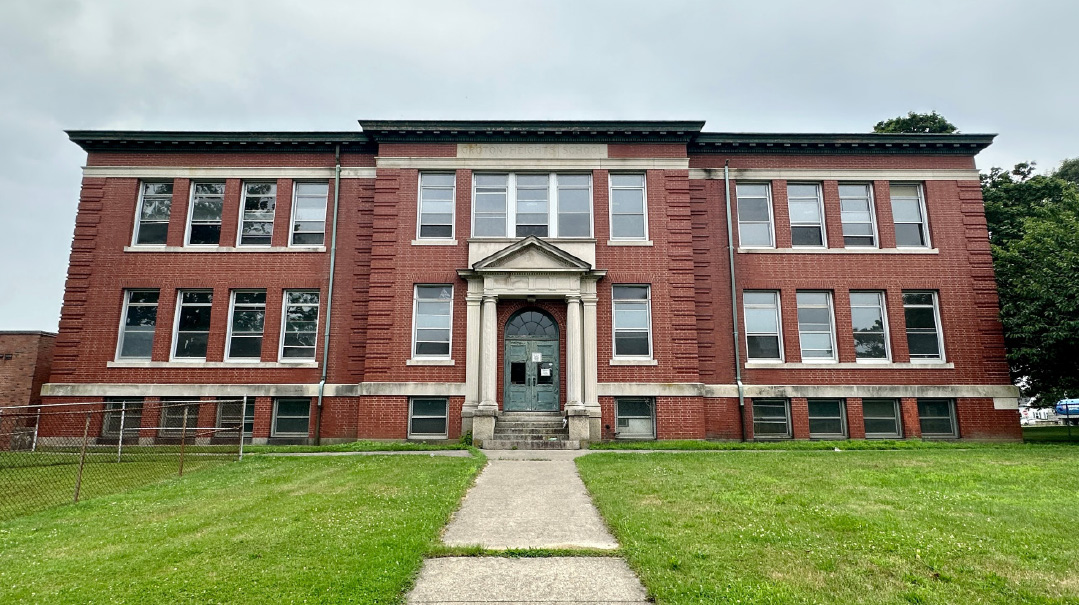The Man Who Would Be Governor


(Photo: Theodore Stephan)
With New York State’s gubernatorial elections coming up on November 6, most New Yorkers are well aware that Andrew Cuomo is expected to be reelected to a fourth term. But most of us don’t really know much about the Republican candidate, Marcus Molinaro, who is challenging Cuomo in this deeply blue state.
In fact, most New Yorkers wouldn’t recognize Molinaro if they saw him on the street. Recently, the campaign invited Mishpacha to sit down with Molinaro and watch him film a WPIX-TV interview with legendary journalist Marvin Scott. Our group gathered in the lobby of the building on Second Avenue as streams of New Yorkers rushed by, but not one person stopped to shout, as only a New Yorker might, “Hey, aren’t you the guy who’s running for governor?”
A Siena College poll conducted in September showed Cuomo with a comfortable lead of 58% to Molinaro’s 36%. So it’s certainly an uphill battle, at best. Yet considering that the deck is stacked against him, he’s maintaining a respectable, if modest, presence.
As much as Molinaro is facing Cuomo, he is also facing demographics. There are over 5.7 million registered Democrats in New York State versus more than 2.7 million registered Republicans. He’s not only on the wrong team, he’s also woefully underfunded. According to media reports, Cuomo’s campaign has raised over $20 million, and still has $9 million in the bank. The New York Times reports that Molinaro’s campaign has cash on hand of just $210,000.
Meet Molinaro
Born in Yonkers and currently living in the town of Red Hook, located in Dutchess County (about an hour and a half from midtown Manhattan), Molinaro serves as the Dutchess County executive and previously served as a local New York State Assembly member. Just 43 years old, he began his political career early as mayor of the village of Tivoli at the age of 19. I ask Molinaro what possessed him to jump into politics at such an early age.
“I was a high school student,” he says, “and hadn’t yet decided what to do when I grow up. So I started volunteering in my hometown of Tivoli by interning with my state assemblywoman. That’s when I fell in love with public service.”
It’s a love affair that apparently hasn’t ended yet, despite the challenges and often the nastiness of running for public office. “What I love the most,” he tells Mishpacha, “is the diversity of our people. Without question the best part of running for governor has been to meet people of so many different backgrounds, races, colors, and creeds. I’ve learned so much from the people I’ve met over the last few months.”
Rabbi Hanoch Hecht, director of Chabad of Dutchess County, met Molinaro over ten years ago and vouches for his character.
“He’s a real mensch,” he says. “A decent, moral person, he’s always been receptive to the community at large.” Rabbi Hecht adds that when anti-Semitic incidents occurred on college campuses in the area, “he stood hand in hand with us and came out very strongly against it. He’s been very supportive to our community.”
Molinaro’s also the ultimate optimist. When asked what he hopes to accomplish campaigning for governor in this heavily Democratic state, he says simply, “I hope to win.” He means that sincerely. “We run to win. This governor has done so little to speak up and defend ordinary New Yorkers who see a system that is rigged against them. No matter where you go, there are people who realize that New York is just too expensive and that the state government is too broken. I’m running as an ordinary New Yorker. Everyone deserves a voice. I want to be that voice.”
Molinaro’s platform is designed to appeal to the middle-class citizen who is drowning in property taxes and is fed up with the perceived corruption of the old boys’ club in Albany. “New Yorkers carry the highest tax burden in America and have one of the highest out-migrations of any state,” he says. He proposes to cut property taxes by 30% over five years, an ambitious proposal to be sure.
In addition, he’s a strong advocate for the rights of the special-needs community. Molinaro’s 14-year-old daughter Abigael was born with a developmental disability. He calls her one of his heroes. “Every day is a struggle for her,” he says. “She teaches us to appreciate the struggles of our lives.”
Spiritual Visit to Israel
Molinaro visited Israel last fall as part of a delegation of political and business leaders from Dutchess County. “It was a remarkably spiritual and educational experience,” he says of the trip, organized by the local Jewish Federation. “We visited schools and hospitals and high-tech businesses. And we learned a lot about what Israel has been doing to overcome environmental challenges as well as their efforts to prepare young people for jobs.”
The purpose of the delegation, Rabbi Hecht says, was to build economic between Israel and Dutchess County, specifically in the farming industry. “I think he was very impressed and moved by what he saw.”
The trip wasn’t all about business. Molinaro warmly remembers his visit to the Kosel on Friday night, where he participated in a celebratory Shabbos meal. “It was wonderful,” he recalls. “For me, it was not only overwhelming spiritually, but it was such a very welcoming environment. Everyone, regardless of where in the world they came from, was celebrating faith at that moment together. Personally, I enjoyed that a lot.”
Molinaro says he values our country’s relationship with Israel. “Truly, we have no more important partner in the Middle East. And New York has to sustain that relationship.”
When I ask Molinaro about President Trump’s decision to move the US embassy to Jerusalem, he says it was “about time.” Would he go back again? “Definitely,” he tells me. “I’ll go back as governor.”
I Like to Localize
On the issue of school choice, Molinaro supports what he calls “creating opportunities for people to have access to the schools of their choice.” This means that he wants to create an environment where “individuals who want to access faith-based education have the right to do so.”
How does he feel about recent attempts in Albany to set standards that would control the curriculum at yeshivos? Molinaro feels strongly that the issue shouldn’t be decided at the state level. “I like to localize,” he explains. “My position is, whether in public or private schools, that the state shouldn’t over-regulate education. Communities should establish the curriculum that works best for them. The people should be able to develop a curriculum that meets their needs.” He then adds a caveat. “Still, certain proficiencies should be achieved, and certain basics should be developed.”
Tolerance and Respect
Politics, says Molinaro, is not just about the agenda and the political platform. It’s about tolerance and respect. “We have to respect each other’s faith and freedoms. Government should treat people fairly. We have to tolerate each other’s views.”
I point out that tolerance and respect seem largely absent in today’s divisive and angry political climate and Molinaro is quick to answer. “That’s inexcusable and we’re heading in a very dangerous direction. We seem to respond to anger with anger and that’s not productive at all. We should spend more time tolerating our differences.”
Last weekend, his own New York City offices at the Metropolitan Republican Club were vandalized. According to a FOX New York news report, Molinaro said the damage included “smashed windows, a spray-painted door, and glue put into the locks.”
A report in the Daily Freeman, a New York state daily, suggests that the vandalism may have had less to do with Molinaro and more with a scheduled event that was to feature a far-right organization. Still, it is disturbing and Molinaro has called upon his opponent Cuomo to denounce the attack. “This type of political violence and rank vandalism is unacceptable,” Molinaro says. “We are one nation and one state. We must not revert to violence under any circumstances.”?No response has yet been forthcoming from Cuomo himself, although Geoff Berman, executive director of the state Democratic committee, said that his party has “zero tolerance for violence.”
Unrelenting Campaign
Despite the overwhelming odds, it seems the Republican challenger represents a thorn in the side of the Democratic incumbent. And that incumbent is doing everything in his power to squelch his opponent thoroughly and completely.
The Cuomo campaign has been steadily attacking Molinaro with ads that seek to depict him as a corrupt politician. One such ad suggests that a local county contractor, Tinkelman Brothers Development Corporation, donated over $5,000 to Molinaro’s campaign and subsequently received many thousands of dollars in tax breaks while also hiring Molinaro’s wife as the company’s director of marketing.
Molinaro responded to the ad by calling Cuomo “a classless buffoon.”
It’s interesting to note Governor Cuomo has not yet agreed to debate his opponent and even his supporters are taking note. City Councilman Ruben Diaz, a Bronx Democrat, minces no words. “Stop hiding!” he says. “Show the people why you deserve a third term.”
Trump Puppet?
Possibly the most effective advertising campaign against Molinaro could be Cuomo’s efforts to paint him as a Trump wannabe, thereby branding him as the Republican puppet of a president who is widely unpopular in the state of New York.
Molinaro is doing his best to distance himself from Trump. He says he didn’t vote for him in the presidential election because he held “significant differences at the time,” and instead wrote in the name of Chris Gibson, a former Republican representative. When I ask the candidate about his thoughts on Trump, he simply says, “Like most people, I wish he wouldn’t tweet so much.”
That didn’t stop the Cuomo campaign from calling his opponent a “Trump mini-me.”
Always an Open Door
Cuomo and Molinaro will share the ballot in November with three third-party candidates — Howie Hawkins of the Green Party, Larry Sharpe of the Libertarian Party, and Stephanie Miner of the Serve America Movement Party. But nobody is suggesting that a Cuomo victory is in doubt.
The last time a Republican served as governor of New York State was in 2002, when a relative unknown named George Pataki overcame Democratic incumbent Mario Cuomo (Andrew’s father). It surprised political observers at the time who didn’t realize that voters were tired of Cuomo.
Molinaro says he is a fan of the often ill-fated New York Mets so he knows all about rooting for the underdog. He is also still fighting for recognition. According to Newsday, a Siena poll found Molinaro was still largely unknown to 71% of likely voters as of this summer.
But political underdogs have triumphed before, and anything can happen in the world of politics. Rabbi Hecht is unfazed.
“I judge an elected official,” he says, “by what type of door he has. Marc’s door is always open and he’s available for any issues, large or small.”
What’s more, he adds politics is unpredictable. “All the cards are stacked against him,” says Rabbi Hecht, “but Hashem is in charge.”
(Originally featured in Mishpacha, Issue 731)
Oops! We could not locate your form.













